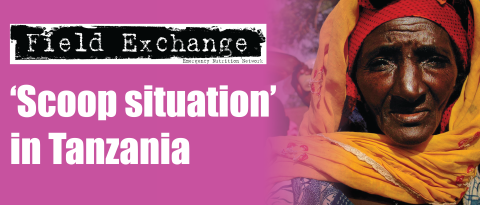Report on WFP Training Workshop in Sudan
By Theresa Loro, WFP Sudan

Group work presentation
Theresa Loro is a Senior Nutritionist working with WFP Sudan and has been based in Khartoum since 2004 as a National Officer for Nutrition and HIV/AIDS focal person. Previously Theresa worked with UNICEF Sierra Leone as UNV Nutritionist for 18 months, and has worked with the Combined Agencies Relief Team (CART), UNICEF Sudan, and the Ministry of Agriculture in Southern Sudan since 1990.
From 6-8 May 2007, WFP Kadugli sub-office, in collaboration with the State Ministry of Health (SMOH) and UNICEF, conducted a three-day Health, Nutrition and HIV/AIDS Messages Promotion Training Workshop in Kadugli locality, Sudan.
The aim of the workshop was to promote appropriate diets, healthy lifestyle measures and protection against HIV that would help in reducing malnutrition and inappropriate feeding practices in children, promote good hygiene and sanitation, and contribute towards the eradication of HIV/AIDS disease. This would complement the work of health workers from MOH, UNICEF and collaborative partners in Kadugli area.
Workshop objectives
- To build up capacities of WFP staff and cooperating partners (CPs) to impart key health, nutrition and HIV awareness messages to beneficiaries at general food distribution (GFD) sites, using a community approach.
- To develop and establish a joint health promotion educational strategy between WFP, MOH, UNICEF and CPs to raise communities' awareness of key issues through community women training. This community based training would takeplace in pilot project selected locations of GFD areas.
Thirty-two participants (18 men and 14 women) attended the workshop, representing eighteen organisations, the Government of Sudan (GOS), United Nations (UN) and non-governmental organisations (NGOs), including WFP staff selected from Kadugli, Kauda and Abyei. Additional representatives from the Federal Ministry of Health (FMOH) and SMOH attended the workshop.
Professionals from the FMOH, SMOH, UNICEF and WFP nutrition unit were the main facilitators of fourteen training sessions. Field sessions in selected community villages were used to practice application of the Training of Trainers (TOT). Participants also practiced formulating training plans to train community-based women in the delivery of health promotion messages.
Opportunities
Most of the partners' organisations' participants had an adequate background in health, nutrition, HIV/AIDS and health promotion educational messages. This will strengthen the community women training in the pilot project's locations.
Collaborative partners involved in the pilot project (SMOH and UNICEF) have mandated strategies and policies that encourage involvement of communities in health, nutrition, and HIV/AIDS and health promotion messages delivery.
Challenges

Practical work in the community session
An evaluation of the training workshop was undertaken. The short time allotted to training sessions limited discussion and interaction between trainers and facilitators, which led to some dissatisfaction amongst participants (19.6%).
The administration of the training budget to cover expenses needed good planning. A per diem/transportation allowance has not been considered/allowed in the training budget planning. This negatively influenced GOS training participants' motivation as they are used to receiving payment in similar organisations' training exercises.
The provision of one meal during the day was insufficient where participants were expected to work for long hours.
Follow up
WFP field monitors and representatives from CPs who participated in health promotion training are now engaged in a pilot project, responsible for the training of community women, selected from 5-6 locations in the GFD targeted areas. Awareness programmes shall be advocated in these communities to disseminate key health messages within the programme planned activities, including nutritional values and preparation of food aid, HIV awareness, hygiene promotion, and diarrhoea management.
Recommendations
- SMOH, UNICEF and WFP should develop clear strategies for community women training programmes.
- SMOH, UNICEF and WFP should set out plans for community women training in the designated pilot project's locations.
- WFP-Khartoum should make sure that training equipments and materials are ready before a community training plan commences.
- Collaborative partners should ensure that more guidance in planning and communication skills and on follow-up of community women training are developed before pilot project community training commences.
- Literacy education partnering projects should be encouraged at project locations, as high illiteracy among the women is a major contributing factor to poor nutritional status.
For more information, contact: Theresa Loro, WFP Sudan, email:Theresa.Loro@wfp.org
Imported from FEX website


